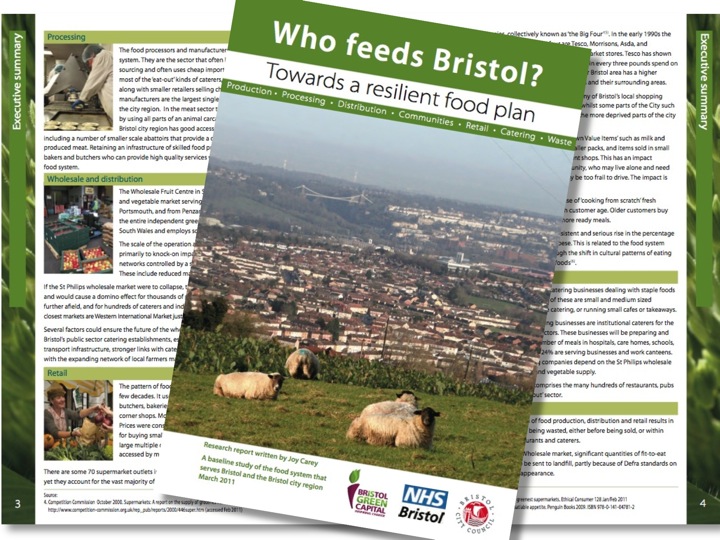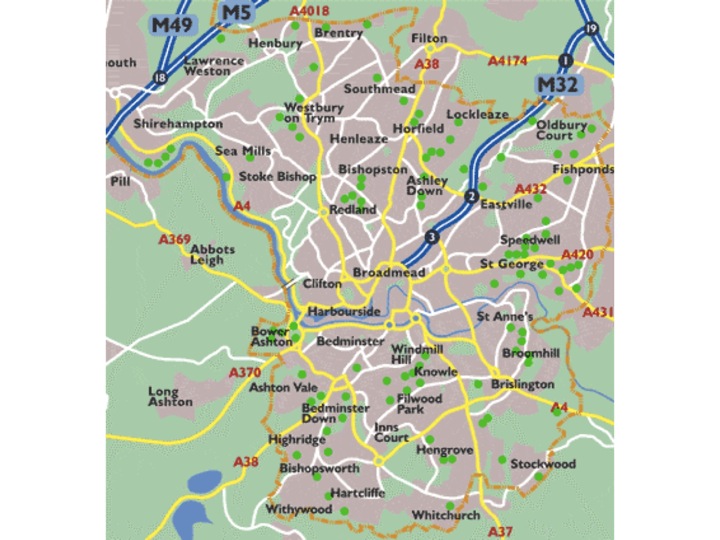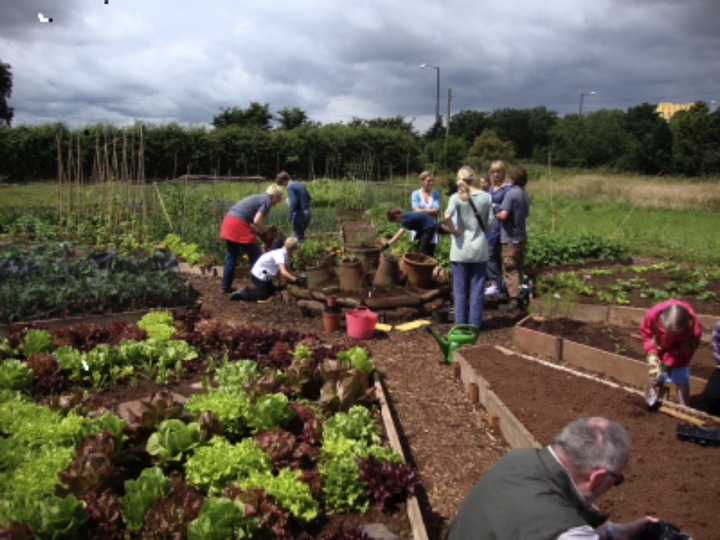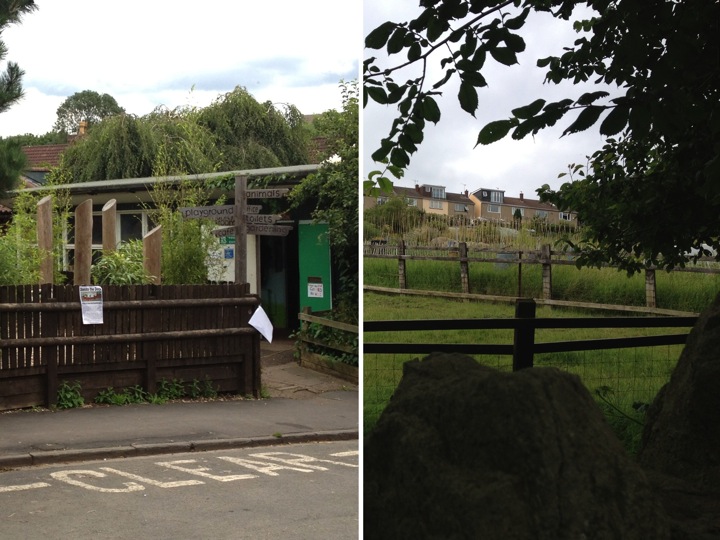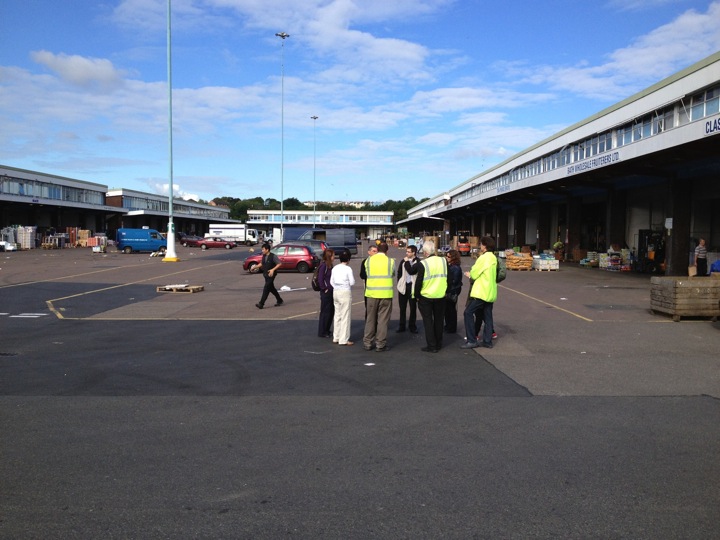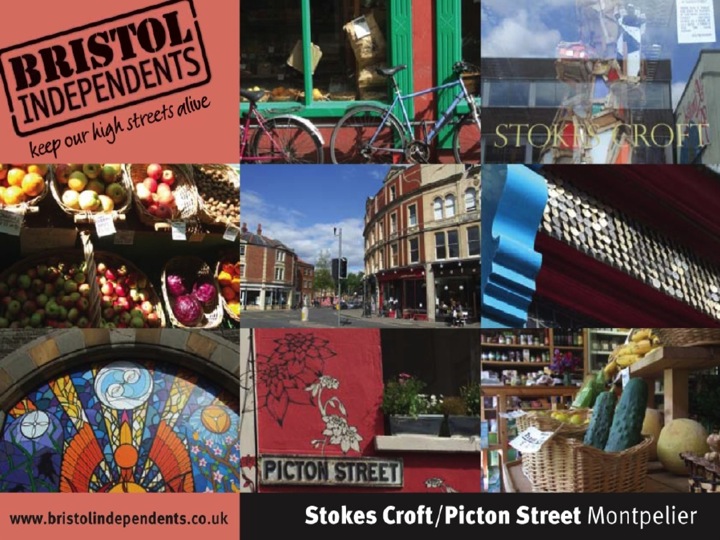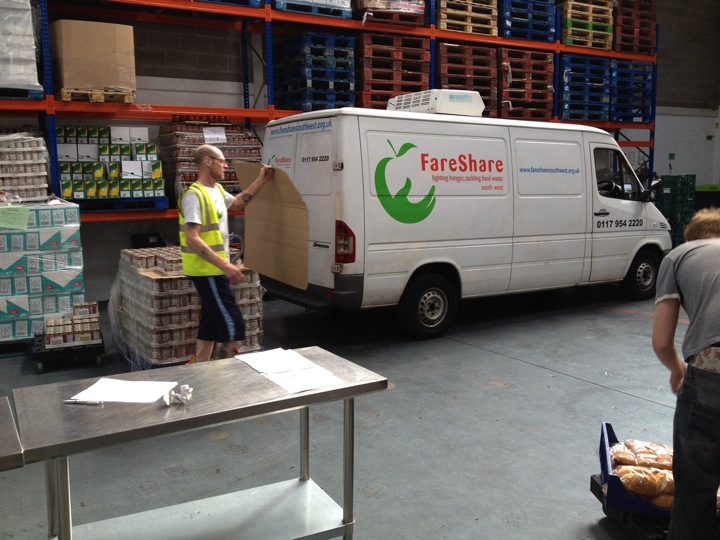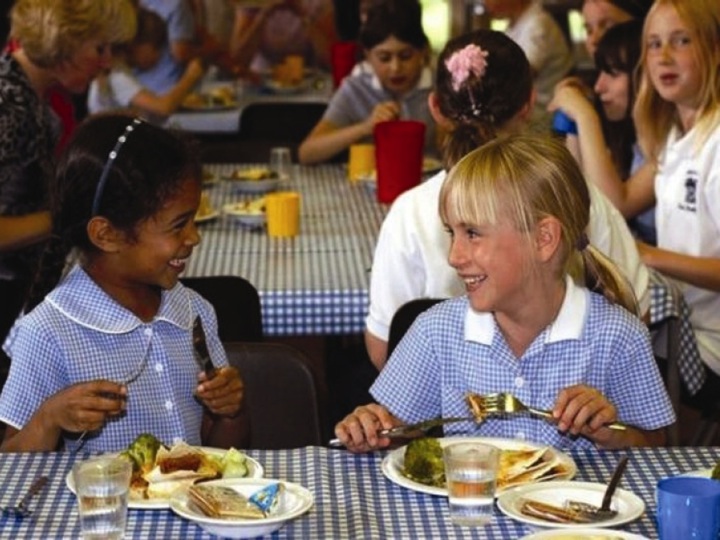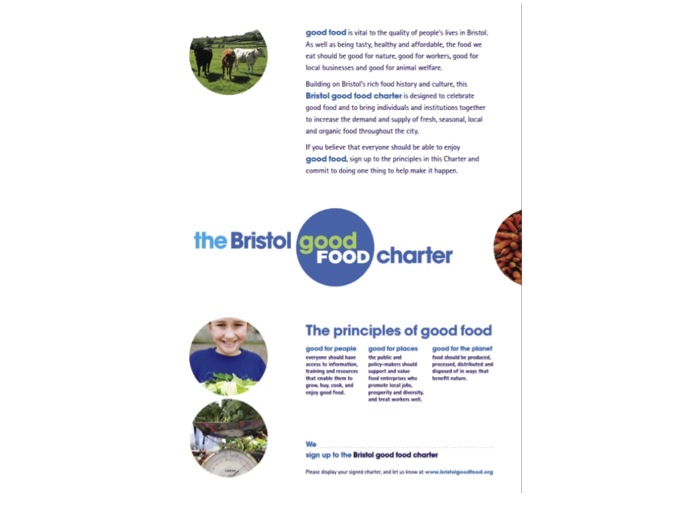Bristol / food and sustainability
The need to look at the food system for Bristol was identified by Bristol’s ‘Green Capital Momentum Group” in late 2009 following the production of “Bristol’s Peak Oil Report”. In the report ‘Who feed Bristol?” (refer box below), it is said that “Bristol’s food system is inextricably linked, now and in the future, with that of the wider region and the rest of the nation”.
| Who Feeds Bristol? | A large and extensive report has been commissioned both by Bristol City Council and NHS Health Services Bristol. The report carried out by an independent expert draws an in-depth and exhaustive overview of food issues in Bristol as a basis for a food systems approach.Growing
Bristol is located in one of the most productive area in UK. Indeed, there are about 5 500 dairy farms that produce 37%of English milk. The region is also home to Yeo Valley which is the leader of organic yogurt in the nation. It is important to stress that the South West contains 38% of England’s organic producers. In the UK as a whole 17.5 million hectares is farmed organically equivalent to 4.2% of UK farmland. Over 10% of this land (1.9 million hectares) is in the South West. The region is also a major producer of livestock, accounting for 23% of England’s cattle and sheep, with 90% being sold to the supermarket trade. “The suitability of the land for pasture combined with the presence of numerous large and small abattoirs, means that it is still possible for smaller-scale livestock farmers to survive economically despite the increasing market difficulties associated with the major consolidation that has occurred in the food business sector.”
Vegetable production in the South West makes up 6% of Great Britain’s production. The main crops produced in the region are potatoes, cauliflower, swedes, brassicas, carrots, parsnips and celeriac.
There is some production of cider apples and soft fruit, but less than there was fifty years ago. Cereal production in the South West is mainly used for livestock feed because the climate is too damp and cool for producing wheat of the quality required for bread flour.
Face to this kind of high carbon footprint production (livestock and dairy), a local procurement with special regards to carbon impact could reduce the global carbon impact without disturbing the economy.
| Bristol City Council allotments | There are 107 allotment sites in Bristol as illustrated on the map above. While the majority of sites are managed by the City Council, some are run by Allotment Associations.
Urban food production has gained popularity in recent years and alongside more traditional approaches current ideas include roof top growing and the combination of hydroponics and aquaponics to create innovative growing systems.
Food growing in gardens and allotments are a centuries-old tradition, both in Bristol and in England as a whole. Private gardens in Bristol may total 120 hectares.
City Council owned land in and around Bristol:
- Allotments : 199 hectares,
- Farmland/agricultural : 239 hectares,
- Grazing : 47 hectares.
Parks & green spaces total approximately 1900 hectares and while much is composed of historic landscape, childrens play areas considerate planting could and does include food growing from herbs to fruit orchards and specimen nut trees.
| Community food growing | The City Council owns a substantial amount of land in the city. With increasing interest from organisations and individuals who want to grow food in the city some of this land is being brought into use for urban agriculture by charities, community organisations, local groups and social enterprises.Potentially these 2,000 hectares if used for food growing in the City could produce several thousand tonnes of produce, with a cash value of several million pounds, in addition to the educational and recreational benefits. 16% of Bristol’s vegetable requirements could be grown within the city.
| City farms | St Werburgh’s Farm in north Bristol is one of several city farms that were established as educational centres for their local communities starting with Windmill Hill City Farm in south Bristol. St Werburgh’s City Farm has a semi rural characteristic despite its urban setting as its fields are located next to large allotment sites and public green open spaces. It’s both a demonstration project for food production and provider of a range of activities for all ages.Delivering
The lack of infrastructures for local distribution is a barrier to increase direct sales to independent local retailers, to households, and to local restaurants and caterers.
| St. Philip Wholesale market | St. Philip’s Wholesale fruit & vegetable market is a collective association of 36 independents and is the second largest wholesale market distributing in South UK. More important, St. Philip is a key infrastructure providing an alternative to the ‘Big 4’, the 4 supermarket chains that cover 90% of grocery market and 83% of vegetable and fruits in UK. It is an important hub providing market access for local food production around Bristol. Ideas are being discussed to explore how the Market might reinvent itself as a more inclusive city based hub for a wider range of sustainable food with access for the general public e.g. by providing café’s and restaurants showcasing organic and locally grown produce.75% of the food eaten by the Bristol population is provided by supermarkets. For fruits and vegetables this rate increases to 90%. St Philips Wholesale market supplies the independents. Bristol has 70 supermarket outlets with more progressing through the planning system and these make up 1.5% of Bristol’s food businesses. Bristol has a disproportionately high level of supermarkets even compared to the national level, resulting in the disappearance of many traditional independent greengrocers. For those who remain, there is a disparity in the geographical repartition: Westbury on Trym still has four registered greengrocers, whereas some parts of the City such as Brislington, Filwood and Lockleaze have none. In order to support and where possible re-introduce small retailers, especially missing in many disadvantaged neighbourhoods, Bristol launched the ‘Independents’ campaign.
| Campaign to save the high street | The ever-growing share of food distribution in the hands of supermarket chains has dramatically reduced the number independents local shops in high streets in much of the UK. Bristol’s High Street Campaign identified 56 designated ‘shopping area’ in Bristol. Committed to a positive campaign the focus is to raise awareness to keep the ‘high street’ alive and vivid and encourage increasing interest and commitment from local people to support their local independent shops. To celebrate independent diversity local people had the opportunity to award the shops they liked best in their neighbourhoods.40% of food is currently wasted throughout the food system from food production, distribution and retail to within households, restaurants and caterers. At the St Philips Wholesale market, significant quantities of fit-to-eat produce have to be sent to landfill, partly because of DEFRA standards on size, shape and appearance.”
| Fareshare | Fareshare SW, the local branch of national charity redistributes about 40 pallets of food per week that would otherwise end up in landfill. 4 staff and 45 volunteers operate a warehouse and distribute food to 80 charity organisations targeting homelessness charities, elderly, young children, refugees etc. Much more food could be collected but some large corporations are reluctant to participate because of the risk of adverse publicity that they waste so much food. Others are concerned about litigation. Local MP Kerry McCarthy is championing a Food Waste bill in Parliament to address many issues to support greater efficiency in the food system.Over 2,000 food catering businesses are registered in Bristol. Most of these are small and medium sized enterprises operating small cafés, takeaways and outside catering.
Around 25% of the catering businesses are institutional caterers for the health and education sectors (hospitals, care homes, schools, and colleges). 24% are serving businesses and work canteens. St Philips wholesale market supplies their fresh fruit and vegetable requirement.
| Food for Life Partnership | To address the UK’s low take-up of school meals and general disengagement with food, the Food for Life Partnership developed a holistic ‘whole school’ approach with a 3 level award system to encourage activity in all aspects of the food system from food growing, to more sustainable food on the menu. This approach has resulted in entire families making more healthy food choices. 3 Bristol schools have reached the first bronze level with strikingly positive impact that extend far beyond food.Enjoying
Bristol has plenty of people who are passionate about food fueling a growth in food growing projects. The Soil Association headquarters is based in Bristol, permaculture groups are active, with a growing number of community orchards and small community kitchens. There are some awards winning restaurants and cafes.
Regular food festivals and events are organised e.g. the organic festival and the VegFest is a huge vegan festival. There are regular ‘Love Food’ events with local suppliers, Slow food markets, and regular farmers markets e.g. weekly farmers market in Corn Street.
From public sector to community groups to individuals many local people are engaged in supporting sustainable food systems. Bristol’s overarching strategic food group is the Bristol Food Policy Council, the Bristol Food Network is a longstanding group of food professionals and Bristol’s Green Capital Momentum Group are all very dynamic.
| The Bristol Good Food Charter | The Bristol Good Food Charter was launched in June 2012 at the Food Conference and is being promoted to raise awareness and activity in all aspects of the sustainable food system in Bristol.Nevertheless, “Supermarket sales data show that within their sales, purchase of ‘cooking from scratch’ fresh ingredients is declining, and that there is a relationship with customer age. Older customers buy more fresh ingredients, whereas younger customers buy more ready meals. Bristol, in common with the rest of the UK, is seeing a consistent and serious rise in the percentage of people, including children, who are overweight and obese. This is related to the food system both through car-dependent shopping habits, and through the shift in cultural patterns of eating with heavy promotion and availability of calorie-dense foods.”
These observations published in “Who feed Bristol?” led the Bristol Food Policy Council to create the Good Food Charter as a communication vehicle to raise awareness and action in the city.
